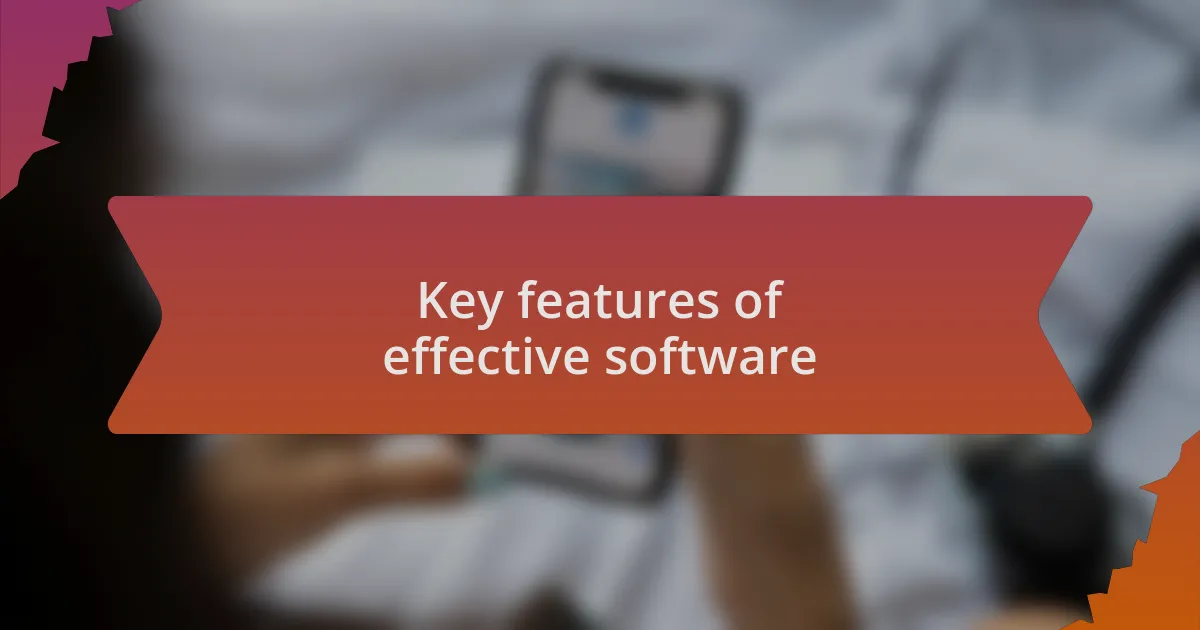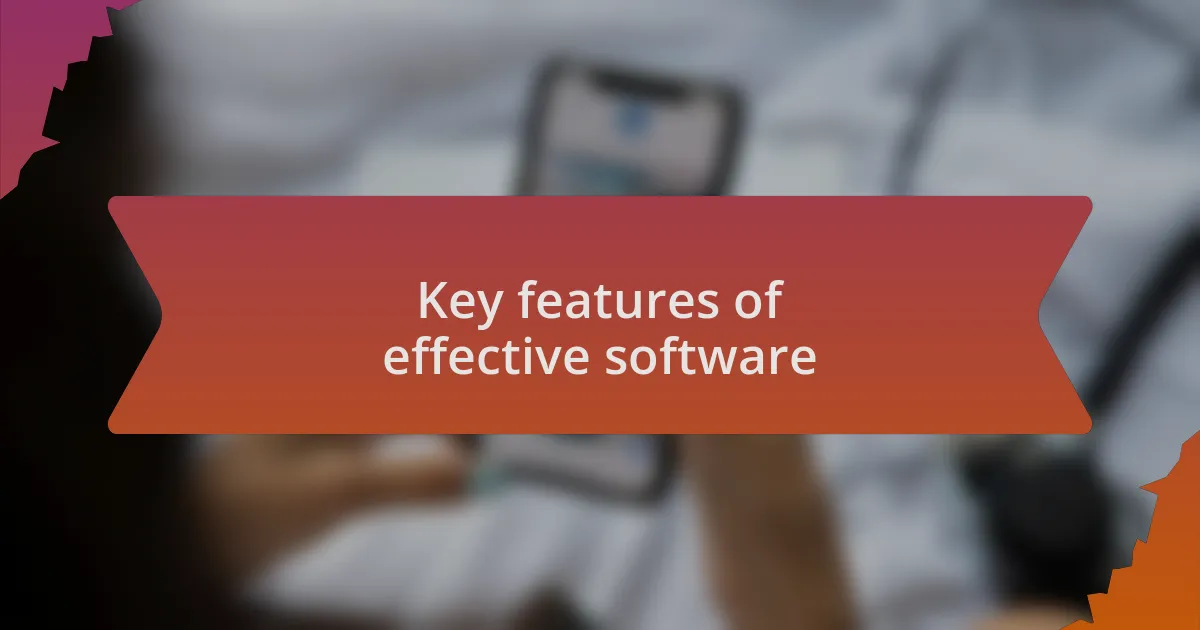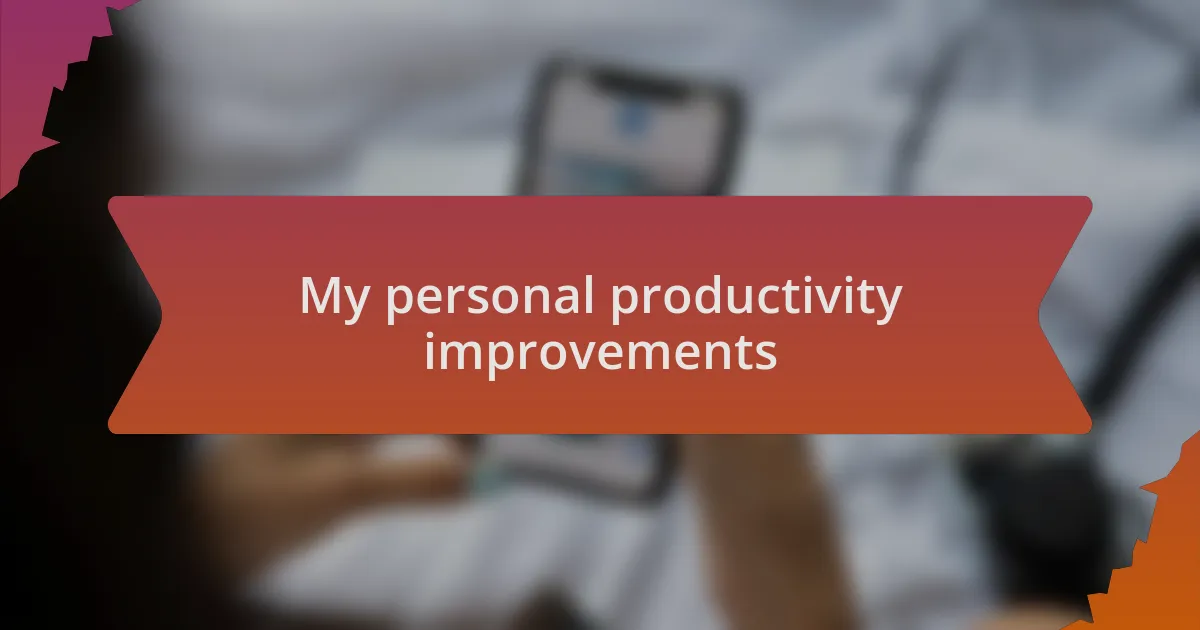Key takeaways:
- Time tracking software offers insights into time allocation, helping users identify unproductive habits and improve their productivity.
- Key features of effective time tracking tools include a user-friendly interface, detailed reporting, and integrations with other applications that enhance workflow.
- The importance of self-awareness and accountability is highlighted as essential for managing time effectively and improving overall productivity.
- Regular reflection on tracked data aids in recognizing patterns and adjusting strategies for better time management and personal growth.
![]()
Understanding time tracking software
Time tracking software is designed to help users monitor how they spend their hours, whether that’s during work, studies, or even daily routines. I remember the first time I started using such a tool; it opened my eyes to how much time I was really spending on tasks I thought were quick. Have you ever wondered how many hours slip away on seemingly minor distractions?
These tools often provide detailed analytics, helping to identify patterns and areas for improvement. I felt a mix of surprise and motivation when I discovered my procrastination habits through the reports generated. Seeing the hard data made me question: How can we improve our productivity without understanding where our time goes?
Understanding time tracking software also means recognizing the various features it offers, from manual entry to automated tracking. Personally, I found the latter particularly liberating; it meant I could focus on my tasks instead of constantly checking the clock. Isn’t it fascinating how technology can transform our approach to time management?
![]()
Benefits of time tracking tools
The most immediate benefit of using time tracking tools is the insight they provide into how we allocate our time. When I first reviewed my weekly reports, I was shocked to see just how many hours I spent on unproductive activities. It made me reflect: What if I dedicated just half of that time to focused work? Imagine the progress I could have made.
Another significant advantage is improved accountability. With time tracking, I found myself more committed to my goals. There’s something about visualizing your efforts that can spark a sense of responsibility. Have you ever felt that urge to do better simply because you were aware of your choices?
Finally, time tracking tools can enhance work-life balance. I learned that setting boundaries became easier when I could see how work hours spilled into personal time. When I made a conscious effort to respect those boundaries, life felt more fulfilling. Doesn’t it inspire you to create a clearer distinction between work and leisure?

Key features of effective software

Key features of effective software
One key feature that I truly appreciate in effective time tracking software is the user-friendly interface. When I first started using one, I was overwhelmed by options, but a clean, intuitive design made it easy for me to dive right in. Have you ever tried navigating through clunky software? It can be a real productivity killer.
Another standout feature is the ability to generate detailed reports. I remember how enlightening it was to see my time categorized by project or task. Such insights don’t just tell you how you spend your day; they guide how you could restructure your routine for better efficiency. Wouldn’t you want a clear picture of where to focus your efforts?
Finally, I find integrations with other tools incredibly helpful. Linking my time tracker with project management apps has made my workflow seamless. It’s like having a well-oiled machine that saves time and boosts productivity. Have you ever noticed how a simple integration can bring all your tools together and enhance your work experience?

My personal productivity improvements
Using time tracking software has dramatically changed how I manage my tasks. I remember the first week after I started using it—I was shocked to see that I was spending over two hours a day on activities that didn’t contribute to my goals. Realizing this was a wake-up call for me. How often do we underestimate the time we waste?
Once I began reviewing my daily reports, I discovered patterns in my productivity. Mornings were my most productive hours, but I was often allocating them to low-priority tasks. Making a conscious effort to schedule my high-impact activities during that time has led to a noticeable improvement in my overall output. Isn’t it fascinating how just a small shift in timing can yield better results?
Moreover, the software has helped me break tasks into manageable chunks. Before, I’d often feel overwhelmed by large projects, leading to procrastination. By using the time tracker to set defined intervals for each phase, I tackled challenges with renewed energy and focus. Have you ever tried breaking down a daunting task, only to find it’s not as scary as you thought?

Lessons learned from my experience
The most significant lesson I learned is the value of self-awareness in time management. One day, while analyzing my weekly summary, I noticed I had spent hours on social media during work hours. It hit me hard—here I was, aiming for productivity while mindlessly scrolling. Have you ever realized how easily we can lose track of time on distractions? That moment prompted me to set stricter boundaries for non-work-related activities during my peak periods.
Another insight that stood out was the importance of reflecting on my progress. I started holding weekly reviews where I would sit down and look back at my recorded hours. This practice helped me understand what strategies worked and what didn’t. It’s intriguing how self-reflection can illuminate paths to improvement when you see your own data laid out. Have you ever taken the time to evaluate your efforts? I found that being open to adjusting my methods has turned my time-tracking journey into a powerful tool for continuous growth.
Lastly, I’ve come to appreciate the role of accountability that comes with using time tracking tools. When I share my results with colleagues, it not only keeps me motivated but also enhances my commitment to my goals. Knowing that others are aware of my progress acts as a gentle nudge to stay focused. How about you? Have you ever found that external accountability can bolster your productivity? For me, it transformed my approach to accountability into a positive force that helps me stay committed to my ambitions.